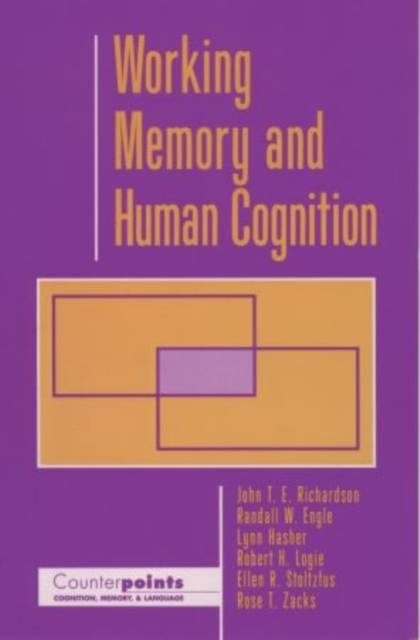
- Retrait gratuit dans votre magasin Club
- 7.000.000 titres dans notre catalogue
- Payer en toute sécurité
- Toujours un magasin près de chez vous
- Retrait gratuit dans votre magasin Club
- 7.000.0000 titres dans notre catalogue
- Payer en toute sécurité
- Toujours un magasin près de chez vous
Working Memory and Human Cognition
John T E Richardson, Randall W Engle, Lynn Hasher, Robert H Logie, Ellen R Stoltzfus, Rose T Zacks
84,45 €
+ 168 points
Format
Description
This new volume in the Counterpoints series compares and contrasts different conceptions of working memory, generally recognized as the human cognitive system responsible for temporary storage of information. The book includes proponents of several different views. Robert Logie discusses the theoretical and empirical utility of separating working memory into an articulatory loop, a phonological store, and a visuo-spatial sketchpad into visual and spatial subsystems. Patricia Carpenter provides evidence for a process view of working memory, arguing that both task-specific processing and general processing capabilities can account for the full range of working memory phenomena. She focuses on findings from reading comprehension and memory tasks suggesting that working memory is used to represent the set of skills and strategies necessary for complex tasks, while retaining residual capacity for use as a storage buffer. Lynn Hasher argues in favor of the new inhibitory model,
with evidence drawn from the literature on aging and pathology that demonstrates parallels between memory disorders and normal memory functioning. Randall Engle addresses the issue of whether working memory resources are required for retrieval of information or whether that task is relatively automatic. Engle's empirical studies, in turn, bear directly on the positions of Carpenter, Hasher, and Logie. As interest in working memory is increasing at a rapid pace, an open discussion of the central issues involved is both useful and timely. This work serves this purpose for a wide audience of cognitive psychologists and their students.
with evidence drawn from the literature on aging and pathology that demonstrates parallels between memory disorders and normal memory functioning. Randall Engle addresses the issue of whether working memory resources are required for retrieval of information or whether that task is relatively automatic. Engle's empirical studies, in turn, bear directly on the positions of Carpenter, Hasher, and Logie. As interest in working memory is increasing at a rapid pace, an open discussion of the central issues involved is both useful and timely. This work serves this purpose for a wide audience of cognitive psychologists and their students.
Spécifications
Parties prenantes
- Auteur(s) :
- Editeur:
Contenu
- Nombre de pages :
- 176
- Langue:
- Anglais
- Collection :
Caractéristiques
- EAN:
- 9780195100990
- Date de parution :
- 16-05-96
- Format:
- Livre relié
- Format numérique:
- Genaaid
- Dimensions :
- 160 mm x 243 mm
- Poids :
- 412 g

Les avis
Nous publions uniquement les avis qui respectent les conditions requises. Consultez nos conditions pour les avis.






